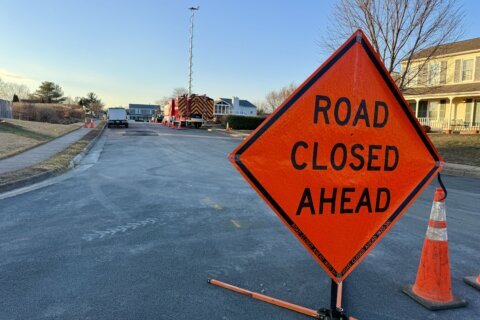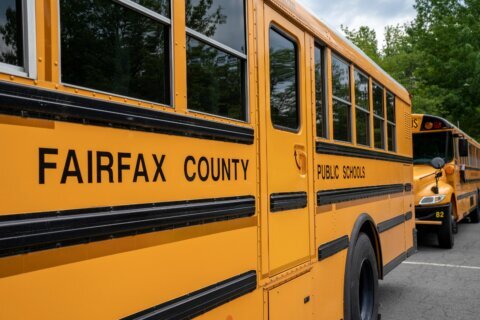FAIRFAX, Va. — Fairfax County taxpayers would see a 2.5-cent property tax increase next year largely to pay for teacher, staff and law enforcement raises under the county executive’s budget proposal presented Tuesday morning to the board of supervisors.
County Executive Bryan Hill warned that not all board priorities are funded in the budget and that current plans for continued cost of living raises and other new programs beyond the budget year that begins in July are not sustainable without significant reforms in coming years.
The budget does not fund all of a planned pre-K expansion or police and sheriff staffing improvements that were recommended in the past.
In his first budget presentation since being hired about two months ago, Hill warned difficult decisions and alternative funding streams are needed in 2020 and beyond to deal with projected shortfalls unless economic growth surges dramatically.
Supervisors largely praised the outlines of the plan, which would increase the county’s contribution to schools by 4.38 percent to fully fund Fairfax County Public Schools’ budget request.
Still, Chairman Sharon Bulova described the average proposed property tax bill increase of $268 to $6,320 per year as “pretty significant.”
The plan includes some increased spending for Metro, cuts based on vacant positions or reduced overtime, and lower-than-expected costs tied to a court ruling on fire department overtime.
Under the plan, $95.1 million of the increase goes to schools, $84.7 million goes to county programs and $8.7 million goes to a cash reserve.
Overall, 52.8 percent of the $8.42 billion in county revenues goes to the school system, an increase of 5.53 percent over the current budget plan. Public safety gets the next largest portion at 11.9 percent.
Most of the increase in both the county and school budgets is used for employee cost of living and other pay increases for teachers, county staff and law enforcement to keep county jobs competitive with others in the region. The raises range from 2.25 percent to 7.25 percent, plus additional possible increases for midcareer teachers.
For lower-paid workers, the budget would index the county-paid minimum wage to any market rate adjustments for other county staff.
The total tax and fee increase for average taxpayers could be 5 percent.
The general fund revenue increase is 4.69 percent over the current year’s adopted plan.
The increase includes 77 new county positions and requested funding for drug prevention, mental health diversion from the court system and new South County police positions to allow the station to open as planned in a few years.
Without tax increases, Hill said cost of living raises would be reduced, schools would get approximately $28 million less in funding and other programs would be cut.
The 2.5-cent increase in the tax rate is expected to add about $268 to an average homeowner’s bill. Even without a rate increase, increases in property values would drive the bills up $131.
The assessment increases are not evenly distributed across the county, so some areas where property values have increased significantly would see assessments increase above the average.
Overall property values are rising slightly faster for nonresidential than residential properties in the county. Home prices are projected to increase 2.17 percent next year, after an increase of 0.68 percent in the current budget year.
Just under 20 percent of total real estate assessment in the county falls on commercial and industrial properties.
Hill suggested speeding up permitting processes and potentially converting empty office space into other uses could help the county’s economy.
Alternatives to property taxes?
While Hill hopes for more funding options than property taxes in the future, Virginia state law limits the taxes that local governments are permitted to impose.
A bit more than 65 percent of the fiscal 2019 budget is projected to come from $2.8 billion in real estate taxes. Personal property taxes (car taxes) make up the next largest share of funding at 14.5 percent ($623.4 million), followed by local sales and business taxes.
As in past years, board of supervisors Budget Committee Chair Jeff McKay highlighted the relatively small fraction of state aid to the county, 2.3 percent of county budget, despite the significant share of income tax payments collected from county residents.
The county has long pushed to get more money sent back from Richmond.
Two bright spots are a declining office vacancy rate in the county and the end of federal sequestration cuts.
Sequestration continues to have a lasting impact on the county though, with fewer federal and federal contracting jobs since 2012 and more jobs in other industries such as education and hospitality.
“We have more jobs, but they’re paying at a lower rate,” Hill said.
Springfield District Supervisor Pat Herrity said that is one reason not to raise the tax rate as proposed.
When including increases to stormwater, trash collection and sewage fees, the average homeowner would see an increase around 5 percent.
“Twenty-six percent over five years, and wages are stagnant for the most part, how do we expect our taxpayers … to absorb 26 percent over five years?” Herrity asked.
A series of public meetings and board committee meetings on the budget are scheduled over the next few months. Final approval of the plan expected to be marked up with final changes April 24 is scheduled May 1.
The board of supervisors is scheduled to vote March 6 on the highest possible tax rate that could be adopted in May. After that rate is advertised, board of supervisors public hearings are scheduled in April.
The School Board is scheduled to hold public hearings on its budget in mid-May, with a final school budget vote May 24.







